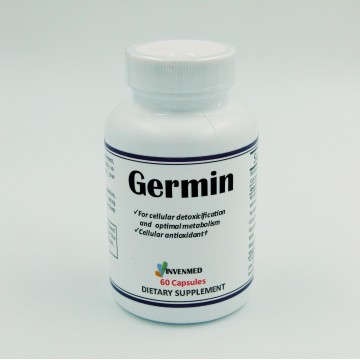Germin
Availability: 91
GERMIN™
Cellular homeostasis
Germin is a dietary supplement. It
consists of five mineral salts: Zinc Sulfate, Potassium Sulfate, Sodium
chloride, Magnesium Sulfate, and Sodium Sulfide (Sodium Hydrosulfide).
FUNCTIONS
The proposed mode of action of the compound is a combination of mineral replacement, redox regulating [1], and K-ATP channels activation [2]. To produce Germin, there is a special heating and binding process to make the mineral supplementation optimal for cellular function and metabolism. This blend of mineral salts has potential therapeutic effects such as anti-inflammatory, anti-viral, anti-diabetic, anti-cancer, along with aiding treatment of wounds, liver diseases and even heart failure. The compound is also a slow and safe donator of H2S. Why is that important? Recently, research has shown that H2S is emerging as a novel gasotransmitter and has protective effects against neurological [3], cardiovascular [4], inflammatory [5], gastrointestinal [5] and cancer [6] diseases. It is proposed that Germin promotes the release of H2S to achieve it therapeutic efficacy. Besides influencing cellular redox potential, the other possible mode of action of Sulfur is through restoring cellular polarization. This effect is mediated by H2S through activating K-ATP channels [7, 8].
Trace
elements deficiencies have been associated with a number of pathological
processes such as delayed wound healing, cell-mediated immune dysfunction, and
in a number of disease states including: sickle cell disease, chronic renal
disease, liver fibrosis and various cancers. However, to combat these natural
minerals such as Zinc plays an essential role in a wide range of cellular
processes. This includes defense against free radicals and maintaining genomic
stability. Zinc has been recognized as an essential trace element. Over 300
enzymes require zinc for their activities and now over 1,000 zinc finger
proteins have been recognized to participate in gene expression of proteins.
Lack of Zinc is often associated with different forms of cancers [9] [10] [11].
Germin is a useful dietary supplement for individuals who want to supplement their lacking diet with trace elements and a gasotransmitter to promote normal cellular function while inhibiting abnormal cellular activities.
SUGGESTED USE
Adults take 1- 2 capsules, 2-3 times
daily before meals or as directed by a healthcare professional.
INGREDIENTS
Mineral Complex from sea salt and
hot spring water, Extract of Fructus Terminaliae Chebulae.
SIDE EFFECTS
No adverse side effects reported.
STORAGE
Store in a cool, dry place, away from direct light. Keep out of reach of children.
REFERENCES
1. Kabil, O. and R. Banerjee, Redox biochemistry of hydrogen sulfide. Journal of Biological Chemistry, 2010. 285(29): p. 21903-21907.
2. Li, L., P. Rose, and P.K. Moore, Hydrogen sulfide and cell signaling. Annual review of pharmacology and toxicology, 2011. 51: p. 169-187.
3. Kimura, Y. and H. Kimura, Hydrogen sulfide protects neurons from oxidative stress. The FASEB journal, 2004. 18(10): p. 1165-1167.
4. Elrod, J.W., et al., Hydrogen sulfide attenuates myocardial ischemia-reperfusion injury by preservation of mitochondrial function. Proceedings of the National Academy of Sciences, 2007. 104(39): p. 15560-15565.
5. Wallace, J.L., Hydrogen sulfide-releasing anti-inflammatory drugs. Trends in pharmacological sciences, 2007. 28(10): p. 501-505.
6. Lee, Z.W., et al., The slow-releasing hydrogen sulfide donor, GYY4137, exhibits novel anti-cancer effects in vitro and in vivo. 2011.
7. Gadalla, M.M. and S.H. Snyder, Hydrogen sulfide as a gasotransmitter. Journal of neurochemistry, 2010. 113(1): p. 14-26.
8. Distrutti, E., et al., Evidence that hydrogen sulfide exerts antinociceptive effects in the gastrointestinal tract by activating KATP channels. Journal of Pharmacology and Experimental Therapeutics, 2006. 316(1): p. 325-335.
9. Doerr, T.D., et al., Zinc deficiency in head and neck cancer patients. Journal of the American College of Nutrition, 1997. 16(5): p. 418-422.
10. Prasad, A.S., et al., Zinc in cancer prevention. Nutrition and cancer, 2009. 61(6): p. 879-887.
11. Yücel, I., et al., Serum copper and zinc levels and copper/zinc ratio in patients with breast cancer. Biological trace element research, 1994. 40(1): p. 31-38.
Pure Power Health Inc. © 2025


